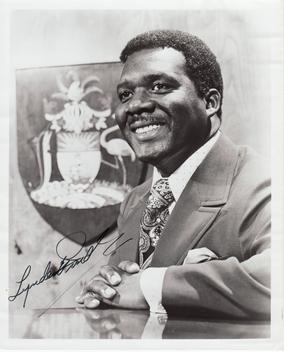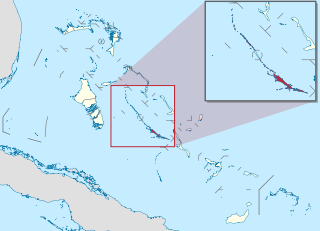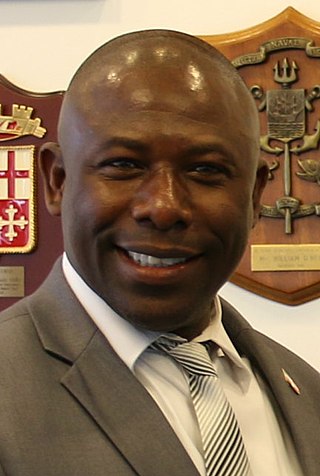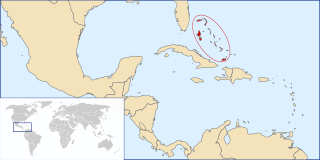External links
| Second-Scheduled Districts | |
|---|---|
| Third-Scheduled Districts | |
| Related | |
The Bahamas Local Government Act of 1996 is a piece of legislation of the Bahamas.
In 1996, the Bahamian Parliament passed "The Local Government Act" to facilitate the establishment of Family Island Administrators, Local Government Districts, Local District Councillors, and Local Town Committees for the various island communities. The overall goal of this act is to allow the various elected leaders to govern and oversee the affairs of their respective districts without the interference of Central Government. In total, there are 31 districts, with elections being held every three years. There are also one hundred and ten Councillors and two hundred and eighty-one Town Committee members to correspond with the various districts.
Each Councillor or Town Committee member is responsible for the proper use of public funds for the maintenance and development of their district.

The Bahamas, officially the Commonwealth of The Bahamas, is an island country within the Lucayan Archipelago of the West Indies in the Atlantic Ocean. It contains 97% of the Lucayan Archipelago's land area and 88% of its population. The archipelagic state consists of more than 3,000 islands, cays, and islets in the Atlantic Ocean, and is located north of Cuba and northwest of the island of Hispaniola and the Turks and Caicos Islands, southeast of the U.S. state of Florida, and east of the Florida Keys. The capital is Nassau on the island of New Providence. The Royal Bahamas Defence Force describes The Bahamas' territory as encompassing 470,000 km2 (180,000 sq mi) of ocean space.

Sir Lynden Oscar Pindling, KCMG, PC, NH, JP was a Bahamian politician who is regarded by some as the "Father of the Nation", having led the Bahamas to majority rule and independence.
A councillor, alternatively councilman, councilwoman, councilperson, or council member, is someone who sits on, votes in, or is a member of, a council. This is typically an elected representative of an electoral district in a municipal or regional government, or other local authority. The title of a councillor varies geographically, with a name generally being preceded by their title in formal or council-related situations in many places.

Andros Island is an archipelago within the Bahamas, the largest of the Bahamian Islands. Politically considered a single island, Andros in total has an area greater than all the other 700 Bahamian islands combined. The land area of Andros consists of hundreds of small islets and cays connected by mangrove estuaries and tidal swamplands, together with three major islands: North Andros, Mangrove Cay, and South Andros. The three main islands are separated by bights, estuaries that trifurcate the island from east to west. It is 167 kilometres (104 mi) long by 64 km (40 mi) wide at the widest point.

Before European colonization, the Turks and Caicos Islands were inhabited by Taíno and Lucayan peoples. The first recorded European sighting of the islands now known as the Turks and Caicos occurred in 1512. In the subsequent centuries, the islands were claimed by several European powers with the British Empire eventually gaining control. For many years the islands were governed indirectly through Bermuda, the Bahamas, and Jamaica. When the Bahamas gained independence in 1973, the islands received their own governor, and have remained a separate autonomous British Overseas Territory since. In August 2009, the United Kingdom suspended the Turks and Caicos Islands' self-government following allegations of ministerial corruption. Home rule was restored in the islands after the November 2012 elections.

Local government in The Bahamas exists at two levels: 32 districts and 41 towns. The boundaries of districts are defined by the First Schedule of The Bahamas Local Government Act 1996, defined with reference to parliamentary constituency boundaries. The Second Schedule lists 13 districts which are divided into town areas. Towns are governed by directly elected town committees. Second Schedule districts are governed by nine-person district councils composed of the chairs of the town committees, and if numerically required, additional people elected by the town committees. The 19 Third Schedule districts are unitary authorities which cannot be divided into towns. They are governed by nine-person district councils which are directly elected by voters. The powers of Second Schedule and Third Schedule councils are slightly different, and the Third Schedule district known as the City of Freeport has a slightly different list of enumerated powers.

Hubert Alexander Ingraham, PC is a Bahamian politician who was Prime Minister of the Bahamas from August 1992 to May 2002 and again from May 2007 to May 2012. He is a member of the Free National Movement Party (FNM). Prior to the 2012 election, he was the FNM's Party Leader and was the Member of Parliament for the North Abaco constituency. He served as leader of the opposition in the House of Assembly of the Bahamas from 2005 to 2007.

Grand Bahama is the northernmost of the islands of the Bahamas, with the town of West End located 56 nautical miles east of Palm Beach, Florida. It is the third largest island in the Bahamas island chain of approximately 700 islands and 2,400 cays. The island is roughly 530 square miles (1,400 km2) in area and approximately 153 kilometres (95 mi) long west to east and 24 kilometres (15 mi) at its widest point north to south. Administratively, the island consists of the Freeport Bonded Area and the districts of East Grand Bahama and West Grand Bahama. Nearly half of the homes on the island were damaged or destroyed in early September 2019 by Hurricane Dorian.

Exuma is a district of The Bahamas, consisting of over 365 islands and cays.

Mayaguana is the easternmost island and district of The Bahamas. Its population was 277 in the 2010 census. It has an area of about 280 km2 (110 sq mi).

The Parliament of The Bahamas is the bicameral national parliament of the Commonwealth of The Bahamas. The parliament is formally made up of the sovereign, an appointed Senate, and an elected House of Assembly. It currently sits at the Bahamian Parliament Building in Nassau, the national capital.

Lesbian, gay, bisexual and transgender (LGBT) people in the Bahamas have limited legal protections. While same-sex sexual activity is legal in the Bahamas, there are no laws that address discrimination or harassment on the account of sexual orientation or gender identity, nor does it recognize same sex unions in any form, whether it be marriage or partnerships. Households headed by same-sex couples are also not eligible for any of the same rights given to opposite-sex married couples.
The Hope Town District Council is a local government council in the Bahamas. It is a third schedule district council located within the Abaco Islands of the northwest Bahamas.

The following outline is provided as an overview of and topical guide to The Bahamas:

The monarchy of the Bahamas is a system of government in which a hereditary monarch is the sovereign and head of state of the Commonwealth of the Bahamas. The current Bahamian monarch and head of state since 8 September 2022, is King Charles III. As sovereign, he is the personal embodiment of the Bahamian Crown. Although the person of the sovereign is equally shared with 14 other independent countries within the Commonwealth of Nations, each country's monarchy is separate and legally distinct. As a result, the current monarch is officially titled King of the Bahamas and, in this capacity, he and other members of the royal family undertake public and private functions domestically and abroad as representatives of the Bahamian state. However, the King is the only member of the Royal Family with any constitutional role.

Renward Ricardo Wells is a Bahamian politician and retired sprinter who has been the Member of Parliament (MP) for Bamboo Town from 2012 to 2021. In sprinting, he specialized in the 100 metres.

The following is an alphabetical list of topics related to the Commonwealth of The Bahamas.

Local government in the Australian state of Victoria consists of 79 local government areas (LGAs). Also referred to as municipalities, Victorian LGAs are classified as cities (34), shires (38), rural cities (6) and boroughs (1). In general, an urban or suburban LGA is called a city and is governed by a City Council, while a rural LGA covering a larger rural area is usually called a shire and is governed by a Shire Council. Local councils have the same administrative functions and similar political structures, regardless of their classification.

The prime minister of The Bahamas is the head of government of The Bahamas. The prime minister is formally appointed into office by the Governor-General of The Bahamas, who represents Charles III, the King of The Bahamas.
Bahamian nationality law is regulated by the 1973 Constitution of the Commonwealth of The Bahamas, as amended; The Bahamas Nationality Act; The Bahamas Immigration Act; and various British Nationality laws. These laws determine who is, or is eligible to be, a national of The Bahamas. Bahamian nationality is typically obtained either on the principle of jus soli, i.e. by birth in The Bahamas; or under the rules of jus sanguinis, i.e. by birth abroad to a father with Bahamian nationality. It can also be granted to persons with an affiliation to the country, or to a permanent resident who has lived in the country for a given period of time through naturalisation. There is currently no program in The Bahamas for citizenship by investment. Nationality establishes one's international identity as a member of a sovereign nation. Though it is not synonymous with citizenship, rights granted under domestic law for domestic purposes, the United Kingdom, and thus the commonwealth, has traditionally used the words interchangeably.